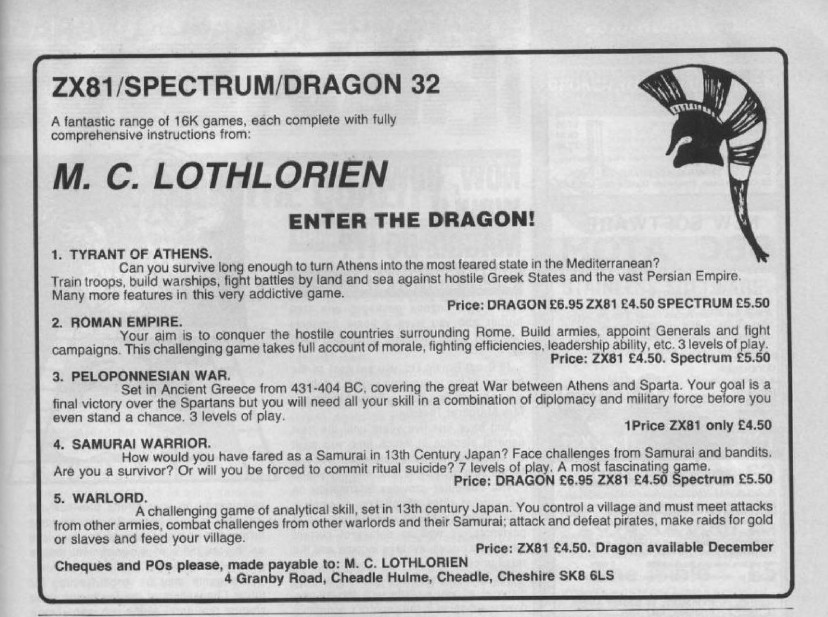
At this point in my chronological coverage of wargames, it’s time to transition to the other side of the pond. Affordable personal computers started flowing into British homes in the very early 1980s with the Sinclair line of products : the ZX80 in 1980, the ZX81 in 1981 and the ZX Spectrum in 1982 – several millions of the latter would be sold in Europe. Other indigenous products, for instance the BBC Micro or the Dragon, completed the rapid growth of the British PC market. For those who want to learn more about the infancy of the British PC industry, I enthusiastically recommend the Digital Antiquarian‘s fascinating account.
The PC’s sudden penetration in British households and the peculiarities of the ZX Spectrum (less capable than contemporary US computers) created a vivid microcosm of video game developers: I counted no fewer than 50 British computer wargames between 1982 and 1984. The earlier of these wargames are typically short and limited in scope, and in this they remind me a lot of the early Avalon Hill games. They were also cheap (as you can see in the ad above, most were sold for around 5£) and often creative – distribution costs were smaller so risks were easier to take.
M.C. Lothlorien was the most prolific of these early wargame developers. M.C. Lothlorien (initially called M.C. Associates) was founded by Mike Cohen, who received a ZX81 from his wife for Christmas 1981, prompting him to learn BASIC and to code, as a hobby, Tyrant of Athens. The topic was familiar to him, as he was a tabletop wargamer and miniature enthusiast owning in particular a full Macedonian miniature army. Cohen then bought a £95 ad placement in the March 1982 issue of Your Computer. His wife believed there was no way he was going to recoup that cost, but he turned that into a bet: “if [the game] makes any money, I’ll buy you a dishwasher out of the profits.” Clearly, the man of the family does not need the dishwasher for himself, I can only suppose he likes to wash everything himself. The game sold 200 copies. Whether or not he really bought that dishwasher remains a mystery.
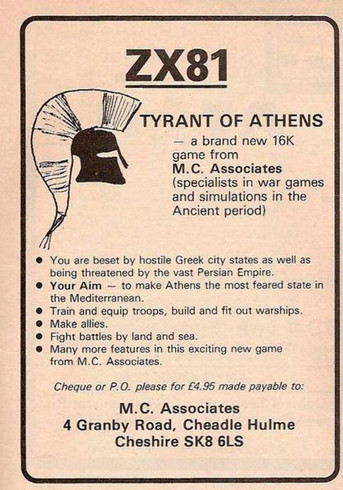
Surprised by this first success, Mike Cohen convinced his school friend Roger Lees (also a miniature enthusiast, except he had a Persian army) to buy a ZX81 to do the same, and shortly thereafter Lees released Samurai Warrior under the name Lothlorien Computer Games. In what sounds like a scene from a sweet buddy comedy, the duo subsequently always bought side-by-side ad spaces to promote their games.
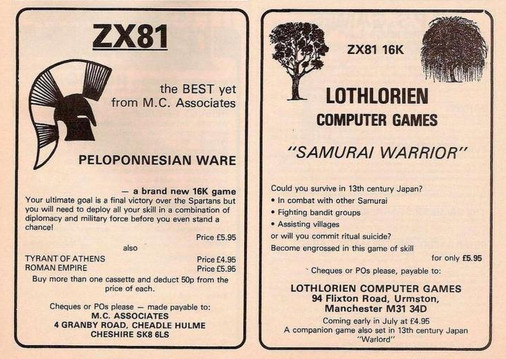
With the release of the Spectrum, Cohen and Lees decided to turn their hobby into a full time occupation and merged their activities in M.C. Lothlorien.
The company released 5 wargame-adjacent games in 1982. Individually, none is significant enough to delve into extensively, but collectively they are a good introduction to the games of a company I am likely to discuss frequently in the coming year, so I’ll be covering them in brief articles over the coming days.
A. Tyrant of Athens
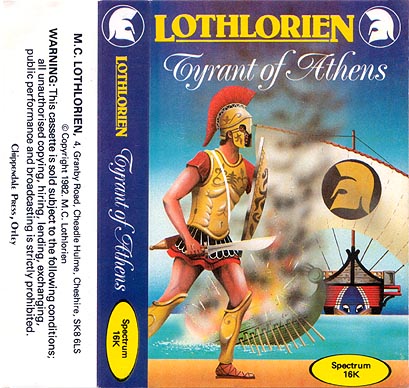
The first of M.C. Lothlorien games, Tyrant of Athens is more a risk-management game than a wargame. The gameplay includes two phases : a management phase and a war phase,
Management phase
In the first part, the player decides where they want to invest their talents. The player earns exactly 4000 talents a year, which must be allocated between troops, warships, merchant ships and importing food. If the player is confident, they can get more talents by selling some food – in any case the consequence of any decision is only effective the following year.
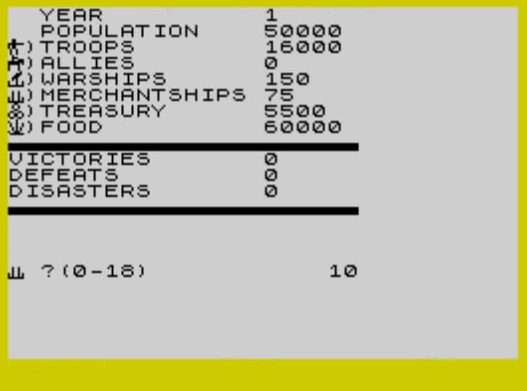
There are some marginally interesting decisions there :
- Each population (including troops) consumes 1 in food every year ; food production is the available (not mobilized) population multiplied by a number between 0.5 and 1.5, which means :
- Due to the randomness of production, the player is always (at best) two bad random rolls from famine, which means they should keep a large cushion of food, which of course reduces the available income,
- Recruiting too many soldiers is not really sustainable, as food production will go down quickly, forcing the player to import food, reducing available income,
- On the other hand, warships are very expensive, and the maximum size of enemy fleets, compared to the starting Athenian number, seems higher (enemy army size ranges from 5 000 men to 20 000 men, but Ionian fleets of 240 ships are not uncommon). Growing the navy’s capability is henceforth difficult,
- The only impact of merchant ships is how much food can be imported or exported. Useless in my opinion.
There is a final decision on how many allies to incorporate as citizens, but more on this later,
War phase
After allocating resources, the player is faced with a series of attacks (from 1 to 6), by land or by sea, by some of its neighbors (Persians, Corinthians, Ionians, Thebans or Spartans). The player must choose whether to refuse combat and pay a light tribute, or fight.
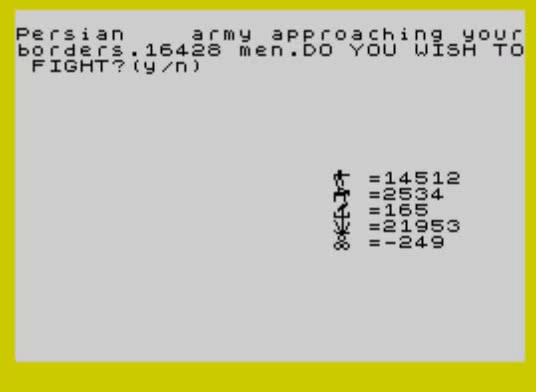
In case of victory, the player will take some marginal losses but recruit some allies (shown as horses on the battle visualization), or in the case of naval battles capture ships directly. In case of defeat, the player will have to pay a heavy tribute, way above what they would have paid had they refused battle.
Allies constitute the last decision in the “management screen”. Every year, the player can give citizenship to up to half their allies. New citizens become soldiers who consume food, but they fight better and don’t risk turning against the player.
And that’s all that about the game. The player must survive 30 years, or alternatively 10 years with twice more victories than tributes paid. On the other hand, twice more tributes paid than victories is instant game over, as is the accumulation of 3 disasters (famine, or being unable to pay a tribute in gold and thus having a part of your population enslaved). In practice, even one disaster is in my experience pretty much impossible to recover from.
Winning Tyrant of Athens is essentially about restraint and refusing battle every time it is risky. Once the player’s power starts to grow, most battles can be won, but still the player must have the discipline to keep a large amount of gold in the coffers, as sometimes the random number generator will be against them, and they will have to pay a tribute. If they do have not the gold, then it is an instant disaster.
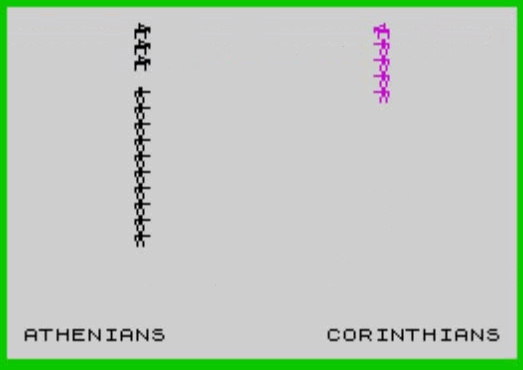
In my final run, year 8, with 3 battles for every tribute paid, my 20 000 soldiers engaged 8 000 Corinthians. I was defeated and unable to pay a tribute, triggering severe punishment : I immediately lost 5000 men, 4000 allied soldiers, 60 warships and 30% of my population. This snowballed into more disasters, and two years later I was ousted from my throne :
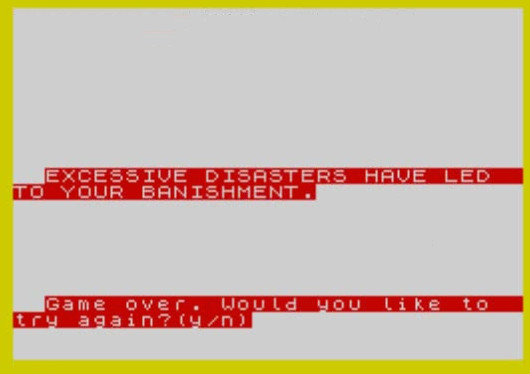
Final assessment : Not a wargame, totally obsolete.
There were not many contemporary reviews on the game : a pure descriptive article in the December 82 issue of Sinclair User, and much later it was covered by Crash magazine, in its review of all Spectrum software in May 1984. Crash magazine warned that there was “no mention of democracy here, and philosophy’s strictly for the sissies.” More seriously, they concluded it was “not one of [M.C. Lothlorien] best games, but reasonably playable.”
Next : Roman Empire